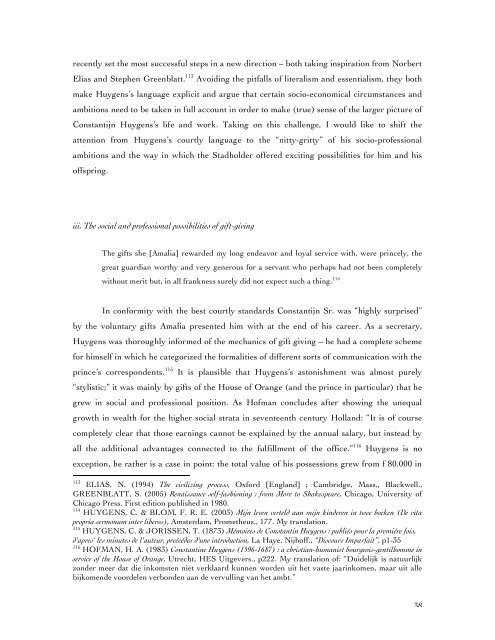Christiaan Huygens – A family affair - Proeven van Vroeger
Christiaan Huygens – A family affair - Proeven van Vroeger
Christiaan Huygens – A family affair - Proeven van Vroeger
Create successful ePaper yourself
Turn your PDF publications into a flip-book with our unique Google optimized e-Paper software.
ecently set the most successful steps in a new direction <strong>–</strong> both taking inspiration from Norbert<br />
Elias and Stephen Greenblatt. 113 Avoiding the pitfalls of literalism and essentialism, they both<br />
make <strong>Huygens</strong>’s language explicit and argue that certain socio-economical circumstances and<br />
ambitions need to be taken in full account in order to make (true) sense of the larger picture of<br />
Constantijn <strong>Huygens</strong>’s life and work. Taking on this challenge, I would like to shift the<br />
attention from <strong>Huygens</strong>’s courtly language to the “nitty-gritty” of his socio-professional<br />
ambitions and the way in which the Stadholder offered exciting possibilities for him and his<br />
offspring.<br />
iii. The social and professional possibilities of gift-giving<br />
The gifts she [Amalia] rewarded my long endeavor and loyal service with, were princely, the<br />
great guardian worthy and very generous for a ser<strong>van</strong>t who perhaps had not been completely<br />
without merit but, in all frankness surely did not expect such a thing. 114<br />
In conformity with the best courtly standards Constantijn Sr. was “highly surprised”<br />
by the voluntary gifts Amalia presented him with at the end of his career. As a secretary,<br />
<strong>Huygens</strong> was thoroughly informed of the mechanics of gift giving <strong>–</strong> he had a complete scheme<br />
for himself in which he categorized the formalities of different sorts of communication with the<br />
prince’s correspondents. 115 It is plausible that <strong>Huygens</strong>’s astonishment was almost purely<br />
“stylistic;” it was mainly by gifts of the House of Orange (and the prince in particular) that he<br />
grew in social and professional position. As Hofman concludes after showing the unequal<br />
growth in wealth for the higher social strata in seventeenth century Holland: “It is of course<br />
completely clear that those earnings cannot be explained by the annual salary, but instead by<br />
all the additional ad<strong>van</strong>tages connected to the fulfillment of the office.” 116 <strong>Huygens</strong> is no<br />
exception, he rather is a case in point: the total value of his possessions grew from f 80.000 in<br />
113 ELIAS, N. (1994) The civilizing process, Oxford [England] ; Cambridge, Mass., Blackwell.,<br />
GREENBLATT, S. (2005) Renaissance self-fashioning : from More to Shakespeare, Chicago, University of<br />
Chicago Press. First edition published in 1980.<br />
114 HUYGENS, C. & BLOM, F. R. E. (2003) Mijn leven verteld aan mijn kinderen in twee boeken (De vita<br />
propria sermonum inter liberos), Amsterdam, Prometheus., 177. My translation.<br />
115 HUYGENS, C. & JORISSEN, T. (1873) Mémoires de Constantin <strong>Huygens</strong> : publiés pour la premiére fois,<br />
d'apres̀ les minutes de l'auteur, preécédes d'une introduction, La Haye, Nijhoff., “Discours Imparfait”, p1-35<br />
116 HOFMAN, H. A. (1983) Constantine <strong>Huygens</strong> (1596-1687) : a christian-humanist bourgeois-gentilhomme in<br />
service of the House of Orange, Utrecht, HES Uitgevers., p222. My translation of: “Duidelijk is natuurlijk<br />
zonder meer dat die inkomsten niet verklaard kunnen worden uit het vaste jaarinkomen, maar uit alle<br />
bijkomende voordelen verbonden aan de vervulling <strong>van</strong> het ambt.”<br />
38


